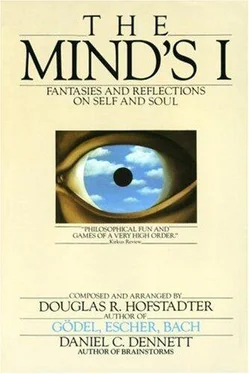“The garden of Forking Paths” is a picture, incomplete yet not false, of the universe as Ts´ui Pên conceived it to be. Differing from Newton and Schopenhauer… [he] did not think of time as absolute and uniform. He believed in an infinite series of times, in a dizzily growing, ever spreading network of diverging, converging and parallel times. This web of time—the strands of which approach one another, bifurcate, intersect, or ignore each other through the centuries—embraces every possibility. We do not exist in most of them. In some you exist and not I, while in others I do, and you do not, and yet in others both of us exist. In this one, in which chance has favoured me, you have come to my gate. In another, you, crossing the garden have found me dead. In yet another, I say these very same words, but am an error, a phantom.
—Jorge Luis Borges “The garden of Forking Paths”
Actualities seem to float in a wider see of possibilities from out of which they were chosen; and somewhere, indeterminism says, such possibilities exist, and form part of the truth.
—William James
It is an attractive notion that the mysteries of quantum physics and the mysteries of consciousness are somehow one. The epistemological loop that Morowitz describes has just about the proper amounts of hard science, beauty, weirdness, and mysticism to “sound right.” However, it is an idea that in many ways opposes an important theme of this book, which is that nonquantum-mechanical computational models of mind (all that goes along with mind) are possible in principle. But right or wrong—and it is too early to say—the ideas that Morowitz presents are worth thinking about, for there is a certainly no question that the problem of the interaction of subjective and objective viewpoints is a conceptual difficulty at the heart of quantum mechanics. In particular, quantum mechanics as it is usually cast accords a privileged causal status to certain systems known as “observers” without spelling out precisely what observers are (in particular, without spelling out whether consciousness is a necessary ingredient of observer status). To clarify this point we must present a quick overview of the “measurement problem” in quantum mechanics, and we will invoke the metaphor of the “quantum wave faucet” for that purpose.
Imagine a faucet with two knobs—hot and cold—each of which you can twist continuously. Water comes streaming out of the faucet, but there is a strange property to this system. The water is always totally hot or totally cold—no in-between. These are called the “two temperature eigenstates” of the water. The only way you can tell which eigenstate the water is in is by sticking your hand in and feeling it. Actually, in orthodox quantum mechanics it is trickier than that. It is the act of putting your hand under the water that throws the water into one or the other eigenstate. Up until that very instant, the water is said to have be in a superposition of states (or more accurately, a superposition of eigen states).
Depending on the setting of the knobs, the likelyhood of cold water will vary. Of course, if you turn on only the “H” tap, then you’ll get hot water always, and if you turn on only “C,” then you’ll get cold water for sure. If you open both valves, however, you’ll create a superposition of states. By trying it over and over again with one setting, you can measure the probability that you’ll get cold water with that setting. After that, you can change the setting and try again. There will be some crossover point where hot and cold are equally likely. It will be like flipping a coin. (This quantum water faucet is sadly reminiscent of many a bathroom shower.) Eventually you can build up enough data to draw a graph of the probability of cold water as a function of the knobs’ settings.
Quantum phenomena are like this. Physicists can twiddle knobs and put systems into superpositions of states analogous to our hot-cold superpositions. As long as no measurement is made of the system, the physicists cannot know which eigenstate the system is in. Indeed it can be shown that in a very fundamental sense the system itself does not “know” which eigenstate it is in, and that it decides—at random—only at the moment the observer’s hand is put in to “test the water,” so to speak. The system, up till the moment of observation, acts as if it were not in an eigenstate. For all practical purposes, for all theoretical purposes—in fact for all purposes—the system is not in an eigenstate.
You can imagine doing a lot of experiments on the water coming out of a quantum water faucet to determine if its is actually hot or actually cold without sticking your hand in (we’re of course assuming that there are no telltale clues such as steam). For example, run your washing machine on the water from the faucet. Still, you won’t know if your wool sweater has shrunk or not until the moment you open the washing machine (a measurement made by a conscious observer). Make some tea with water from the faucet. Still, you won’t know if you’ve got iced tea or not, until you taste it (interaction with a conscious observer again). Attach a recording thermometer just under the water faucet. Until you yourself see the reading on the thermometer or the ink marks on its record, you can’t know the temperature. You can’t be any surer that the ink is on the paper than you are that the water has a definite temperature. The critical point here is that the sweater and the tea and the thermometer, not having conscious-observer status themselves, have to play along with the gag and, just as the water did, enter their own superpositions of states—shrunk and nonshrunk, iced-tea-and-hot-tea, ink-high-and-ink-low.
This may sound as if it has nothing to do with physics per se but merely with ancient philosophical conundrums such as “Does a tree in a forest make a noise when it falls if there’s no one there to hear it?” But the quantum-mechanical twist on such riddles is that there are observation consequences that are diametrically opposite to the consequences that would occur if a seemingly mixed state were in reality always a true eigenstate, merely hiding its identity from observers until the moment of measurement. In crude terms, a stream of maybe-hot-maybe-cold water would act differently from a stream of water that is actually hot or actually cold, because the two alternatives “interfere” with each other in the sense of overlapping waves (as when part of a speedboat’s wake momentarily cancels another part reflected of a jetty, or when a skipped rock’s successive bounces send out ripples that crisscross and create shimmering patterns on a still lake surface). It turns out that such interference effects are only statistical, so the effect would become manifest only after a large number of sweater-washings or tea-makings. Interested readers should consult the beautiful exposition of this difference in The character of Physical law by Richard Feynman.

The plight of Schrödinger’s cat carries this idea further—that even a cat could be in a quantum-mechanical superposition of states until a human observer intervened. One might object, and say, “Wait a minute! Isn’t a live cat as much of a conscious observer as a human being is?” Probably it is—but notice that this cat is possibly a dead cat, which is certainly not a conscious observer. In effect, we have created, in Schrödinger’s cat, a superposition of two eigenstates one of which has observer status, the other of which lacks it! Now what shall we do? The situation is reminiscent of a Zen riddle (recounted in Zen Flesh, Zen Bones by Paul Reps) posed by the master Kyōgen:
Читать дальше












